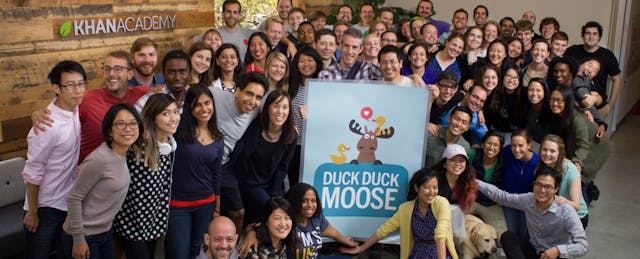Like many parents, Sal Khan has bought Itsy Bitsy Spider, Park Math and other educational apps created by Duck Duck Moose, a San Mateo, Calif.-based startup. But the Khan Academy founder just scored what sure looks like a bargain: getting the company’s entire product suite, along with its development team, for less than what he paid for those apps.
On Aug. 25, Duck Duck Moose announced that it has “donated” its intellectual property and become a wholly-owned subsidiary of Khan Academy. Khan says his team paid $1—a legal formality required for asset transfers.
“We’ve always viewed early learning as part our mission,” he tells EdSurge in an interview, “but we didn’t have the capacity.” With the acquisition, Khan says his team now has the resources to “create products that prepare kids, from the moment they’re ready to use a mobile device, for kindergarten.”
As part of the deal, Duck Duck Moose’s nine full-time employee will join the nonprofit, and all 21 of its apps will be made available for free.
The merger between one of the world’s most famous education nonprofits and a venture-backed, for-profit startup is an unusual move. Added to the mix is the Omidyar Network, whose philanthropic arm is giving a two-year, $3 million grant to Khan Academy. This money, specifically earmarked to support Duck Duck Moose’s product development and operations, is “about half of what we need,” Khan told Fortune. He is actively soliciting additional funding. (Omidyar also invests in for-profit companies, including EdSurge.)
Founded in 2008, Duck Duck Moose has developed 21 educational apps that have been downloaded more than 10 million times. Most are aimed at children between the ages of 2 and 7. Prior to the deal with Khan Academy, these apps cost between 99 cents and $2.99. (Update 9/6/16: Khan Academy reports that these apps have now surpassed more than 15 million total downloads.)
Along the way, the company raised $7 million in venture capital from several brand-name investors, including Sequoia Capital, Lightspeed Venture Partners and Stanford University.
Despite its popularity, and racking up 53 app awards from organizations including Consumer Electronics Show and Children’s Technology Review, Duck Duck Moose faced “a challenging market” and had been “trying to find ways to be sustainable,” says co-founder Caroline Hu Flexer. The team had entertained acquisition offers from several companies. Names and terms were not disclosed—although it seems none offered the right mix of financial and growth incentives for Duck Duck Moose and its investors.
“Khan Academy was always on the top of our list,” Hu Flexer adds. “There were for-profit [acquisition] options, but our investors understood how we were trying to impact the world. They were very supportive and helped make this deal happen.”
Many education startups struggle to sustain solely on revenue from app stores, as Khan observes. “Paid apps have turned out to be a difficult business,” he says. “Most of the successful businesses have turned either to in-app purchases, or shifted their focus more to pure entertainment.” As a standalone company, Khan says Duck Duck Moose “wasn’t going to work, but their portfolio of apps is one of the most exciting for early learning.”
Still, Khan, a former financial analyst, was “incredulous” when Hu Flexer first made the offer to join Khan Academy back in February 2016. “I told them, ‘You guys are for-profit. Are your investors cool with this?’” To be sure, Khan called several of them.
“At the end of the day,” Khan recalls from those conversations, “the investors felt like something great was created at Duck Duck Moose, and wanted their legacy and impact to continue, rather than getting sucked up by another company.”
Khan’s team then reached out to Omidyar Network to secure funding to support the transition. Isabelle Hau, a partner at Omidyar, jumped at the opportunity to help “one of the best app developers, backed by parental endorsement and research, distribute great apps under the Khan Academy umbrella.”
The Duck Duck Moose team will remain in their headquarters in San Mateo, Calif. Hu Flexer anticipates expanding the team to “create a comprehensive offering for kindergarten readiness” for use in homes and classrooms.
How fast that growth happens may depend on Khan’s ability to securing additional support. “I do hope we can find more philanthropic support or corporate sponsorship” to sustain Duck Duck Moose’s efforts, he says.


